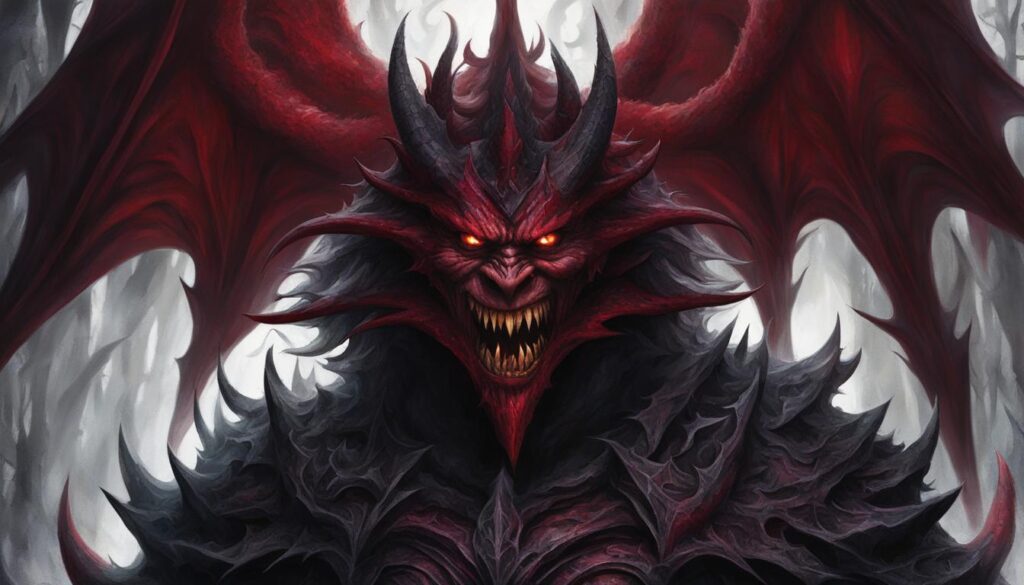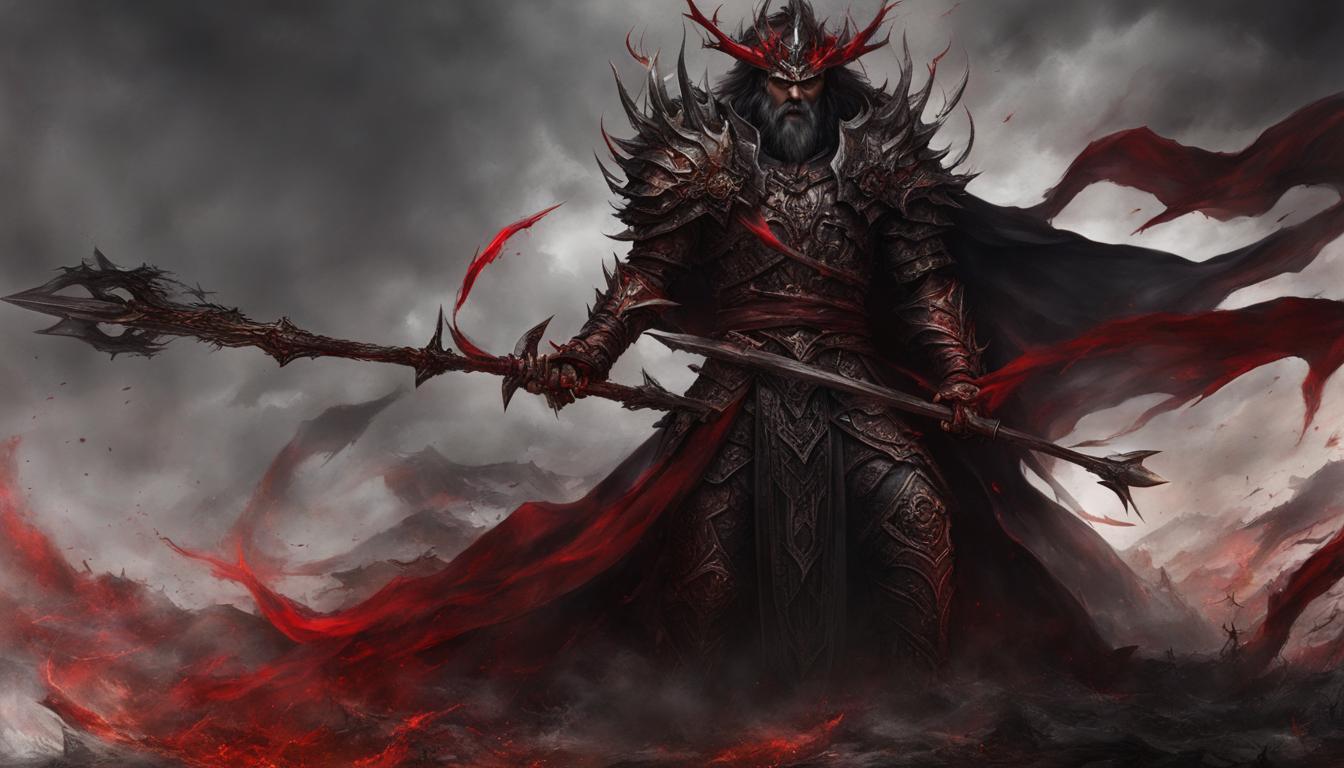If there is one enigmatic villain who has left a chilling influence throughout Stephen King’s works, it is undoubtedly the Crimson King. The king’s presence dominates King’s multiverse saga, and the character’s mystique is as captivating as he is terrifying. In this article, we will take a closer look at the Crimson King and decipher the mysteries shrouding this unparalleled Stephen King character.
From the origin and mythology of the Crimson King to his portrayals across King’s novels, we will explore the significance and influence of this iconic villain who has inspired both fear and admiration in Stephen King’s followers. Whether you’re a seasoned King reader or simply intrigued by the world of horror and dark fantasy, join us as we delve into the Crimson King’s dark world.
The Origin and Mythology of the Crimson King
Stephen King’s multiverse saga is known for its rich mythology and complex characters, and the Crimson King is no exception. This enigmatic villain has fascinated readers for years and is a central figure in the series, with ties to the iconic Dark Tower.
The origin of the Crimson King is shrouded in mystery, with various interpretations and theories surrounding his backstory. Some believe he is an ancient demon, while others suggest he is a representation of chaos and destruction. What we do know is that his influence extends far beyond the borders of any one story, as he is a pivotal character in Stephen King’s interconnected universe.
As the villain of the series, the Crimson King is often associated with evil, but his motivations and ultimate goals are not always clear. His enigmatic nature only adds to the allure of this character, with fans speculating on his true purpose and the larger implications of his actions.
The mythology built around the Crimson King also includes cosmic elements, such as his connection to the ominous Outer Dark and his alleged status as a god-like being. These larger-than-life elements add to the complex portrait of this iconic villain, making him one of the most unforgettable characters in Stephen King’s literary world.
Portrayals of the Crimson King in Stephen King’s Novels
Stephen King’s Crimson King has been depicted in various forms across several of his novels. The enigmatic villain first appeared in “Insomnia,” where he serves as the primary antagonist of the story. In this novel, he is portrayed as a powerful and malevolent force that seeks to control the minds of his victims.
The Crimson King also plays a significant role in the “Dark Tower” series, where he serves as the overarching villain of the entire saga. He is depicted as an otherworldly being who seeks to destroy the multiverse and rule over the ashes. In this series, his characteristics are explored in greater detail and his origins and motivations are slowly revealed through the narrative.
Beyond these two works, the Crimson King has made appearances in other interconnected stories in Stephen King’s literary universe, including “Black House” and “The Talisman.” In each of these instances, he is portrayed as a menacing figure with immense, supernatural power.

Characteristics, Motivations, and Actions of the Crimson King
Across all these portrayals, the Crimson King is depicted as a powerful and malevolent being with a grand ambition of destruction and domination. He is often described as a being beyond our comprehension with a chilling influence over the multiverse. His motivations vary depending on the story, but they often involve the desire for power, control, and dominance. His actions are consistently evil and destructive, leaving a trail of death and misery in his wake.
The Crimson King’s Significance in Stephen King’s Works
The Crimson King’s significance in Stephen King’s works cannot be overstated. As the overarching villain of the “Dark Tower” series, he serves as the ultimate obstacle for Roland and his ka-tet throughout their journey. His influence permeates throughout Stephen King’s literary universe, tying together different stories and creating a larger, cohesive narrative. His presence has become a hallmark of Stephen King’s horror mythos and has left an impactful legacy on popular culture.
The Influence and Significance of the Crimson King
The Crimson King holds a prominent place within Stephen King’s literary universe, having a significant impact on the story’s themes and characters. His influence reverberates throughout the multiverse saga, affecting the primary and secondary characters and creating a sense of pervasive danger and unease.
The significance of the Crimson King stems from his enigmatic and dark nature. As the ultimate embodiment of evil in King’s works, the Crimson King is a symbol meant to reflect the bleakness and ugliness of reality. As such, he brings to light uncomfortable truths surrounding the human condition, and his impact on the story’s themes cannot be overstated.
What is intriguing about the Crimson King is that his presence is felt even when he is not present physically. This is due to the character’s omnipresence and his effect on other characters, which creates a sense of unsettlement and unease for readers.
His cultural and symbolic importance can also be seen outside of Stephen King’s works, with the character’s influence having extended its reach into popular culture. Examples include his appearances in video games, comic books, and other media, highlighting the impact the Crimson King has had on various forms of entertainment.
The Crimson King in Popular Culture
Beyond the world of Stephen King’s novels, the Crimson King has left his mark on popular culture, becoming an enduring and influential figure in the broader entertainment landscape. The character has been referenced in a variety of media, including movies, TV shows, and video games, cementing his place in the collective imagination of audiences.
One of the most notable appearances of the Crimson King outside of Stephen King’s works is in the popular TV series “Supernatural.” In Season 5, the show introduces the character of Lucifer, who seeks to release the Darkness, an ancient evil force that threatens the world. In the season finale, the Darkness is revealed to be Amara, a deity-like figure who embodies chaos and destruction. Her appearance is accompanied by a brief glimpse of the Crimson King’s symbol, linking her to the Dark Tower universe and establishing a direct connection between the two fictional worlds.
The Crimson King has also made appearances in video games, such as the popular MMO game “World of Warcraft.” In the game, the character is referenced as a deity worshiped by the followers of the Twilight Hammer, a fictional cult within the game’s lore. The Crimson King is portrayed as a powerful, god-like being who seeks to bring about the end of the world, a theme that echoes his role in Stephen King’s novels.
The Legacy of the Crimson King
The Crimson King’s presence in popular culture highlights his enduring legacy and impact as one of the most iconic villains in modern literature. His influence extends beyond the pages of Stephen King’s novels, inspiring and captivating audiences across various media platforms. As a symbol of evil, chaos, and destruction, the Crimson King remains a chilling reminder of the darker aspects of the human psyche and our fascination with the unknown and the otherworldly.
Exploring Fan Theories and Speculations Surrounding the Crimson King
As a character with a rich and enigmatic history, the Crimson King has inspired countless fan theories and speculations about his true nature and motivations.
Some fans have speculated that the Crimson King is not actually a villain but a misunderstood antihero, while others believe that he represents a larger cosmic force beyond human comprehension.
One popular fan theory suggests that the Crimson King is actually a manifestation of the human subconscious, representing the darkest aspects of human nature and the collective unconscious.
Another theory proposes that the Crimson King is a metaphorical representation of addiction or mental illness, as his influence on characters in Stephen King’s novels often mirrors the destructive and all-consuming nature of these issues.
Regardless of the specific interpretation, the fan community’s engagement with the Crimson King speaks to the enduring legacy and impact of this iconic character in Stephen King’s multiverse saga.



